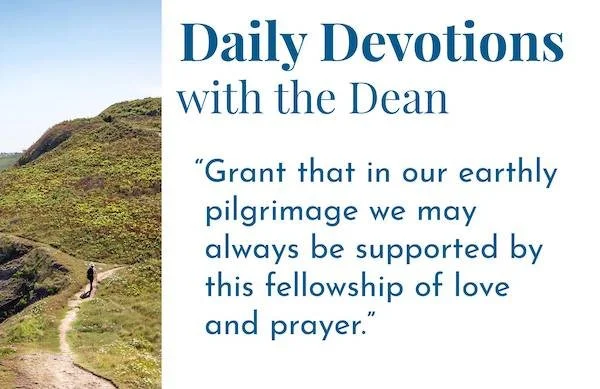Monday • 4/29/2024 •
Monday of the 5th Week of Easter
This morning’s Scriptures are: Psalm 56; Psalm 57; Psalm 58; Leviticus 16:1-19; 1 Thessalonians 4:13-18; Matthew 6:1-6,16-18
This morning’s Canticles are: before the Psalm reading, Pascha Nostrum (“Christ Our Passover,” BCP, p. 83); following the OT reading, Canticle 9 (“The First Song of Isaiah,” Isaiah 12:2–6, BCP, p. 86); following the Epistle reading, Canticle 19 (“The Song of the Redeemed,” Revelation 15:3–4, BCP, p. 94)
When death comes, it presses down hard. I feel it in my bones whether I’m at the funeral of a son or daughter taken too soon, or a person in their 90s who’s lived a “good long life.” And in our world, so many deaths … from the scourge of a worldwide pandemic, from violence in our streets and homes, from the unleashing of the dogs of war, from tornados and fires and floods and famine. Each death has happened to a unique, irreplaceable bearer of God’s image. Each death leaves a trail of grief. With death hanging in the air all about us, as it has since Cain killed Abel, it’s heartening to see Scripture face death’s reality head on.
We do not want you to be uninformed, brothers and sisters, about those who have died, so that you may not grieve as others do who have no hope. — 1 Thessalonians 4:13. By the time Paul writes to the Thessalonians, it’s the A.D. 50s. Two decades have passed since Jesus’s resurrection, ascension, and promise to return. Loved ones have died. People are wondering about what has happened to their dead spouses, children, parents, friends. And people are wondering about whether, in fact, the Lord will return.
Image: Pixabay
Paul writes this paragraph to assure believers of five things:
First, the very same Jesus who lived on earth, died, rose, and ascended to heaven will indeed return to this earth. In the next paragraph (tomorrow’s reading) and in 2 Thessalonians, Paul will say more about the when and the how—more about that from me when we get to 2 Thessalonians.
Second, those who have died will not be at any disadvantage when Christ returns. In fact, they will have the privilege of being gathered first: “The dead in Christ will rise first.” There’s a mystery here. The point is, the Bible offers this comfort: there is both an ongoing present for those who have died in Christ, as well as a genuine future. In another letter, Paul opens the window the tiniest bit on to what’s going on now with his followers who have died. As he contemplates the prospect of his own death, the apostle says: “To be absent from the body is to be present with the Lord,” and that that would be “far better” (Philippians 1:23). Elsewhere, the New Testament opens the window just a little wider, indicating that those who have died in Christ make up a heavenly “cloud of witnesses” cheering us on in our race, even as they cry out to the Lord on behalf of the church down here, “How long, O Lord?” (Hebrews 12:1; Revelation 6:10).
Third, those who, at the time of Christ’s return, are still living on the earth (“who are left”) will go second. They will be “caught up” (commonly referred to as “the rapture” — 1 Thessalonians 4:17).
Fourth, at that time all of us—those who will have already died, and those “who are left” and who will have been “caught up”—together will form Christ’s triumphant company in his final, glorious victory over death. (Paul offers more perspective on that conquest in 1 Corinthians 15; as does John in Revelation 19-20.)
Fifth, Paul would have us encourage one another with these words. Our grief over the loss of loved ones in Christ is real. We miss them acutely, and achingly wish they were still with us. But our grief is filled with hope. We know that those whom Christ has taken to himself are truly in a “far better” place. What is more, we know that the day is coming when, reunited with them, we will witness Christ deliver the final death blow to death itself.
Until then, especially when the memory of those you’ve lost is sharp and presses in upon you, I pray you find further comfort in this collect from the BCP (pp. 255, 395):
Almighty God, by your Holy Spirit you have made us one with your saints in heaven and on earth: Grant that in our earthly pilgrimage we may always be supported by this fellowship of love and prayer, and know ourselves to be surrounded by their witness to your power and mercy. We ask this for the sake of Jesus Christ, in whom all our intercessions are acceptable through the Spirit, and who lives and reigns for ever and ever. Amen.
Be blessed this day.
Reggie Kidd+



